Someone In A Tree
Someone, I tell you, will remember us, even in another time. Sappho
March or Parade? Does it matter? Is the divide real or one only of words?
Like the use of gay or queer, much depends on your background, age, class, education, and nationality. I’m not a big fan of either word but we don’t have one that’s better. LGBT? With or without additions? It’s not so long ago that the NY Times finally changed its policy to allow their reporters to use ‘gay’ instead of ‘homosexual’. A change that, while it might seem inconsequential, marked a major shift in that newspaper’s language and attitude, an acknowledgement of a minority that probably makes up a not insignificant portion of its readership and the nation.
A couple of Sundays ago, Woodstock NY hosted its first Pride event. Since I live nearby I took myself to the Comeau Property where we assembled, to tag along with the unaffiliated stragglers making up the rear. It seemed that heavy rain that morning might cut down on numbers, and perhaps it did, but there were still a good many people ready to take part and lots of rainbow flags being handed out. Waiting for things to get under way, chatting with a group of young women perhaps in their early twenties, I mentioned that I’d been there that night. At the Stonewall. Not that I’d taken part or even saw what went down, but even so, perhaps a sideways witness to history, someone in a tree? None of them seemed to know what to make of this information, or care much about it. I guess I looked very old to them, and irrelevant, like the event itself perhaps. Given the power of myth, what actually went down that June night in ’69 no longer matters.
Woodstock isn’t a big place; not really a town, I think its official designation is still ‘hamlet’. We left the holding area off the western end of Tinker Street, walked up to the village green greeting people along the way—there was a good turn out despite a lingering chance of rain, everybody showing up for the celebration, men, women, families, kids, dogs, lots of dogs—and then we turned left onto Rock City Road (‘If there was a person for every rock in the ground it’d be a city’), and up the short walk to the old Colony that has recently been revamped and given new life. In all, about eight minutes. And of course, as most of us do, I thought of how things used to be, how, when I was nineteen in 1969, such an event would have been unthinkable, and if I wasn’t wearing anything rainbow-colored I was holding a small flag, and if I wasn’t waving it I still enjoyed the feeling of an ordinary, everyday kind of freedom.
Does this mean we won? After so much unnecessary drama, so many lies, so much fear-mongering, so much needless misery, is this the longed-for happy ending? Is this what equality looks like?
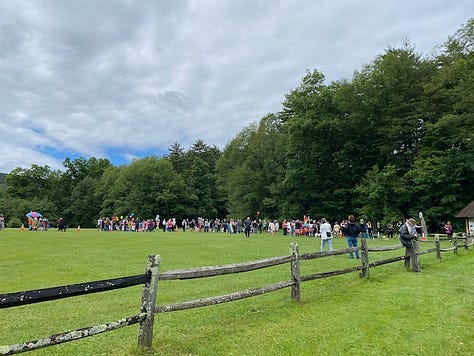
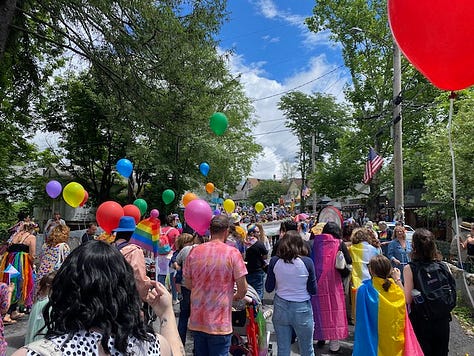
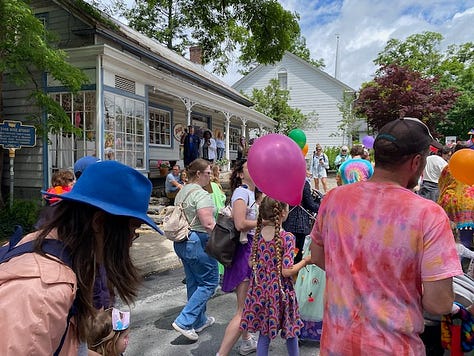
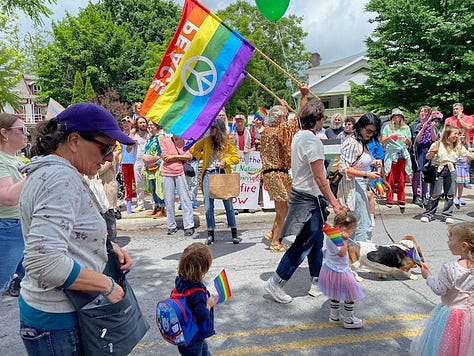
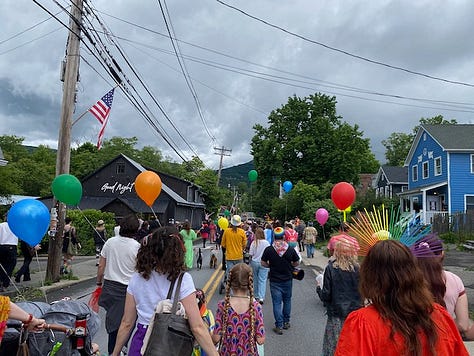
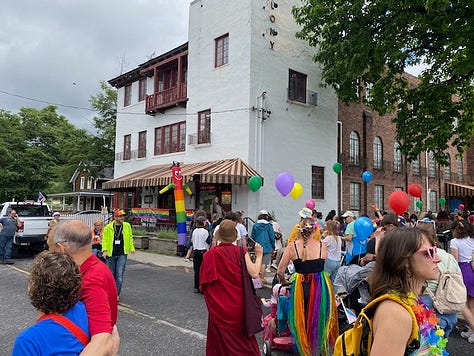
That Friday night in June, 1969…
January of ’68 the Tet Offensive was launched, the war in Vietnam was raging, so were protests at Columbia; universities across the country called in the cops; April, Martin Luther King Jr was assassinated at Memphis; in August, chanting The whole world’s watching! demonstrators almost shut down the Democratic Party’s Chicago Convention; heavily armed police rioted, attacking protesters on the streets outside the hall as Hubert Humphrey accepted the nomination inside; the press denounced the police violence after some of them got roughed up, the public sided with the cops; barefoot girls, panhandling on 8th Street, held signs saying ‘Just back from Chicago’; in a very close three-way election, Nixon, running on law and order, won with less than one percent of the popular vote but carried the electoral college; in April of ’69, the cast of Hair was on Ed Sullivan and June 26, Judy Garland’s body was lying-in-state at a funeral home on Madison and 81st—the line outside was long, twenty-thousand people waited for hours to file past her coffin—another event I remember walking past, though not why I was in the neighborhood. (Years later, piecing together half-remembered scraps, I realized that in ’57, when I was eight, I’d seen her in person at a London theatre; my father must have been subbing in the band, needed to see the show, and took my mother and I. We stood at the back. I remember moments from We’re a Couple of Swells, and a woman sitting on the edge of the stage singing Over The Rainbow). All this, and much more, formed the background to what took place that night.
Let me do now what I haven’t done before, compare what I remember about the night of June 27 1969, with what facts I can reconstruct. I was in a play downtown at the Public Theater. During rehearsals I’d become close with one of the other cast members and before too long he became my first boyfriend. That much is true. According to the NY Times review, the play, Invitation to a Beheading, based on the only novel by Nabokov that I don’t much like, opened March 18. That same month, the cast of Hair was on Ed Sullivan (After its initial production at the Public, it opened on Broadway minus most of the book and with a new director in ’68 but had missed the cut-off date for that year’s awards.) and indictments were handed down for eight of the leaders of the Chicago protests. April 20, John took me to my first fancy party thrown by a producer he knew who had a play nominated at that year’s Tonys. Hair lost best musical to the trifling 1776. I remember being at the party watching, live on TV, the cast of Promises Promises performing Turkey Lurkey Time staged by Michael Bennet. At the end of the sensational number some jaded voice drawled, ‘Well that’s the first time that’s ever worked.’ The stereotypical queen’s refusal to be impressed that passed for wit was new to me. That it shocked me is why it stuck. (If you want to see for yourself—I recommend it—the number is here on YourTube.)
What I remember, and what I’ve described in the past, was that John was out sick Friday June 28 and missed the performance. But knowing now when it opened that would mean the show ran for over three months, which seems unlikely. Checking the IOBDB (the Lucille Lortel off-Broadway database) I see that it didn’t, that it closed May 6. Is my memory of walking past the Stonewall Inn that Friday night on my way to John’s place on Hudson a mirage? In my memory, I went west on 8th Street, crossed 6th Avenue, continuing on Christopher to Sheridan Square. Like eyewitness testimony, memory’s a shaky thing. For years I was convinced that the old Women’s House of Detention, a New York City landmark, was on 7th Avenue opposite St Vincent’s hospital (no longer there) at 11th. I spent months constructing an elaborate sequence for Songbook based on that certainty. However, when I finally checked a map, as I checked the online database, I discovered that memory had misplaced the old jail and that, despite my certainty, it was actually one block east on 6th.
From Stonewall, Martin Duberman’s fine if romantic history of the event, published in 1994 to mark the twenty-fifth anniversary, Stonewall was ‘a real dive, an awful, sleazy place set up by the Mob for hustlers, chickens (underage boys) to be bought…’ Duberman adds nuance but the bar remained at best a Mafia clip-joint serving watered down drinks out of dirty glasses, at worst a fire trap where no one would willingly go if they had a choice, though it was the only bar that tacitly allowed dancing. In memory I walked past around 11:15, maybe later. If anything about that memory can be believed the evening was warm, the door was open, a man in a black suit stood barring the way. Unless I’ve added him from another time I’d walked past. But why would the door be open? The place would have been air-conditioned. The windows were lined with plywood and painted black. I was eighteen, I’d be nineteen later that summer, I’d never been in a gay bar, certainly not in any place like the Stonewall.
The Village was scruffier then, a friendlier place where you could still live cheaply, before rising real estate prices transformed it. Anyhow, that night I walked past heading west, thinking nothing of it. The next day I walked past again; the window had been smashed, there was police tape about, and a couple of wary cops. Like the queen’s attempt at sophistication at the Tony party, the oddness of the scene outside the Stonewall the morning after the first protest was what made it stick. I have no memory of finding out what had taken place till much later, even though the protests and heavy police presence—riot cops trained to handle anti-war demonstrations had been brought in—continued for the next few days. I was mostly concerned with getting a job, with John, and with the draft; though I wasn’t a citizen I was 1-A, available for military service—and could expect soon to be called up. I left for London in August.
From Stonewall: ‘… but this raid was different…’ (The two Mafia thugs who owned the lease paid off the cops to minimize damage from raids that were routinely conducted along with advance warning. The Stonewall Inn wasn’t alone in that respect, the gay bars were all run by the Mafia and could be hugely profitable.) ‘… the raid had occurred at one-twenty A.M.—the height of the merriment—and with no advance warning to the Stonewall management…’ Perhaps because the Federal Bureau of Alcohol, Tobacco, and Firearms was after some corrupt cops at the Sixth Precinct who were taking kickbacks from the bar, closing their eyes to its trade in highjacked liquor. ‘… a number of other eyewitnesses sharply contest the view that the arrest of a lesbian was the precipitating incident, or even that a lesbian had been present in the bar.’ Though this is one of the enduring myths of that night it’s always seemed unlikely to me: the bars were heavily segregated, self-selecting by gender, race, and class, with very little mixing going on. ‘According to an eyewitness, a number of incidents were happening simultaneously. There was no one thing that happened or one person, there was just… a flash of group—of mass—anger…’ This seems believable. Anyhow, it was after the cops had barged in, checking out customers and staff to see who they’d let go and who they’d book and take in, and were trying to load them into the wagon, that trash cans began to be thrown, that the window was broken, that coins, bricks, and dog shit was thrown at cops as they retreated, barricading themselves inside. Then someone squirted lighter fluid onto the plywood at the broken window, setting it on fire.
And so it went: the fags fought back. It wasn’t the first time, and it certainly wan’t the first demonstration; the Annual Reminders, protests in Philadelphia that took place outside Freedom Hall on July 4, was in its fifth year. But it was the spark that brought people together in New York and beyond. At a meeting called to discuss how to proceed leaders of the older-established homophile associations urged caution, moderation, the avoidance of confrontation; if they discouraged the low-lifes and freaks who hung out in such places making everyone look bad, maybe police raids weren’t such a bad thing? ‘Acceptance [it] was cautioned, would come slowly by educating the straight community with grace and good humor…’ At which point an unnamed, angry young man got up and yelled “We don’t want acceptance, goddam it! We want respect!”
It was young men like him who organized a march next year, the Stonewall Commemorative March For Freedom from the now-closed bar to the Sheep Meadow in Central Park for a rally with speeches; that event expanded into annual Christopher Street Liberation Day Parades, these continued to grow, eventually being re-branded as the Pride march we know today. Then as now, the juice is with the young people, and if some older men and women don’t like the direction in which it’s going—deploring the fetish wear, furries, go-go boys in speedos, leather daddies, etc—they’re no longer calling the shots.
The 2019 March in New York City was the 50th anniversary of the Stonewall raid. For the first time I climbed down from my tree to tag along. Mostly I strolled behind a group of local men and women who were waving flags and calling out. I couldn’t help but look at all the young men behind the barricades, there with their girlfriends, waving flags and screaming, thinking that these were exactly the boys I was afraid to encounter walking on dark streets in the Village in ’69 on my way—or not—to John’s place. Missing what I thought was a great opportunity to add context, to honor those who’d gone before, the parade organizers chose a couple of British actors to be the Grand Marshals instead of those still living who’d taken part in the Philadelphia demonstrations where men dressed in suits and ties, women in demure dresses and gloves, as they circled slowly, holding placards calling for acceptance, for justice. The watchword of the 2019 parade was ‘Tolerance’. And yes, I see where they were going, but I was with that young man back in the day yelling that what we want is respect. Because nothing less than respect will make up for the years we were forced, and still are forced, to live in shame. Only respect will lift that burden. No grand gestures need be involved, merely the day to day respect we normally pay each other as we go about our business.
I recommend Duberman’s book; it’s available at Amazon and I’m sure your local bookstore could get it for you. Mine is the Golden Notebook, the parade went right past—flags outside—as we made our way along Tinker Street, past the green (paved now but still an open space at the heart of the village) In summer, on Sunday afternoons there’s drum circle, anyone can take part; you should stop by some time, it’s really very nice, a very nice place to live, or live near, to be adjacent to. The sun was out all the way along Tinker Street and when we turned the corner with Rock City Road. There would be a comic and tea dance at the Colony (there’s always a tea dance). As we made our way to the end, clouds came over the sun and the bright light faded: the march was at its end.
None of us knows what’s ahead, realistically or not many are fearful. We’ve seen the devastation caused by American Evangelicals in places like Uganda where ‘aggravated homosexuality’ carries a death sentence. It’s not hyperbole to say that what they’ve achieved there is what they hope to achieve here, because they keep telling us that what they want is to strip us of civil rights, human rights, to drive us back into silence and fear. So I guess I don’t really care if we call it a march or a parade, so long as we can see it take place. When disadvantaged groups finally achieve lives lived in the open, it’s an indicator that society is doing well. Because some of us are acting out means that all of us are doing better.
This moment has been here before. Young people have demanded a more equitable society before and for a time it looked like they were winning. Then Nixon dragged out the war to ’75 so he could win another election promising that victory was just around the corner, and in the process how many young American men were killed, how many Vietnamese were murdered?
We know what to do; we know who’s stopping us; but this time can we stop them?
In 2019 the 50th anniversary march was re-routed to go along Christopher Street, past the completely rebuilt Stonewall Inn to Sheridan Square.

